Amid the reality of persistent drug use, Quest Diagnostics Employer Solutions offers data-driven insight and industry experience to help you make the best decisions about building and managing your workforce in order to comply with applicable state and federal requirements.
In the same way that no 2 companies are alike, no 2 state drug testing laws are identical. Each state has its own unique legal requirements, which can include regulations and statutes that on the surface do not appear to be related to drug testing.
Regardless of your industry (transportation, construction, manufacturing, professional, scientific and technical, etc), understanding the intricacies of the diverse makeup of state laws can make the difference between being compliant and being exposed to increased legal liability. There are 5 things every employer should know about state drug testing laws.
How do federal drug testing regulations interact with state laws?
If a state drug testing law directly contradicts a federal regulation, such as the drug and alcohol testing regulations of the US Department of Transportation (DOT), the federal regulations will prevail. It is important to understand that this general rule only applies to employers who are covered by a federal mandate to drug test; it does not apply to the testing of non-covered employees and applicants. For instance, some DOT-covered employers choose to also drug test their non-DOT workers. The non-DOT portion of a company’s program is governed by state laws.
There are certain elements of a comprehensive drug testing program that are not covered by federal regulations. For example, the DOT regulations do not mandate that an employee who fails a drug test be terminated, but state law may impose conditions on taking such action in the event of a first-time positive result. Employers should take the time to know the state laws that apply to them even when complying with a federally mandated drug testing regulation.
For employers with operations in multiple states, which state law applies?
The simple answer is, “all of them.” Some employers make the mistake of assuming that the law of the state where they are headquartered is the only one that applies when developing a drug testing policy. For multi-state employers it is necessary to comply with all applicable state laws.
Generally, a well-written, researched drug testing policy can cover much of the legal requirements for each applicable state law. But addendums to the base policy are often needed when certain state law requirements differ from the basic tenants of a company’s policy.
What is the difference between a voluntary and a mandatory drug testing law?
A number of states have programs that offer special incentives to encourage employers to conduct drug testing. If an employer chooses to participate in such a program, their company must comply with the drug testing requirements of that voluntary program.
For example, Florida offers a 5% discount on workers’ compensation premiums to employers who drug test in accordance with voluntary regulations provided by the state. Outside of that voluntary program employers are free to conduct drug testing as desired, within reason and in compliance with any other applicable state laws.
On the other hand, many states have mandatory drug testing laws that apply to any employer with operations in that state. For instance, if you are an employer in Iowa and you wish to conduct drug testing, you must comply with the state’s existing mandatory drug testing law. It’s also worth noting there are typically no incentives offered in exchange for compliance with mandatory laws.
What is an industry-specific law?
Several states have mandatory laws that apply to specific industries. Illinois, for example, has a mandatory law for companies with public works contracts with the state; it only applies to public works contractors. West Virginia has a mandatory law that applies to certain types of companies in the mining industry.
Additionally, some states have mandatory laws for certain government agencies, police and fire departments, childcare facilities, nursing homes, etc.
Industry-specific laws can be complex as they tend to require drug testing to be conducted under specific circumstances such as following an accident, when reasonable suspicion of drug use exists, or sometimes on a random basis. It is also not uncommon for such laws to defer to other laws and regulations regarding drug testing procedures.
Many laws must be considered, and a variety of workplace implications. Partnering with an experienced company is more important than ever. Quest Diagnostics Employer Solutions provides comprehensive drug testing for businesses that can’t afford to compromise.
What other types of laws affect workplace drug testing laws?
Currently, the most noteworthy non-drug testing state laws that can affect a company’s program are medical and recreational marijuana laws. In some cases, these laws place conditions on employers when acting upon the result of a positive test result for marijuana. In Nevada, for example, employers cannot refuse to hire an applicant who tests positive solely based on the positive marijuana test. In New York, employers are prohibited from testing for cannabis under most circumstances. Additionally, employers may not discriminate against lawful users of marijuana in certain states.
Other state laws that can have a direct impact on drug testing are workers’ and unemployment compensation regulations. In many states, workers’ compensation regulations allow employers to move to deny benefits if the individual was impaired or under the influence of drugs or alcohol at the time of an accident, and a positive drug test result can be used to make that argument. These regulations often include specific requirements for how a test is conducted, including which drugs to include in a test panel.
Finally, most states have prominent or precedent-setting case law that either clarifies a drug testing statute or further defines what employers can and cannot do. In California, for example, case law governs workplace drug testing in the absence of a dedicated law.
Partnering with a compliant laboratory should not be a compromise
While Quest Diagnostics does not provide legal advice relative to state drug testing law, we ensure that our testing processes comply with the stringent requirements of being a laboratory certified by the Substance Abuse and Mental Health Services Administration (SAMHSA).
We recommend that employers research all applicable laws and consult with state law experts to help them better understand how to ensure compliance. In particular, look for state law requirements regarding when to test (pre-employment, post-accident, reasonable suspicion, random, etc), how to test (using a certified laboratory vs rapid-result devices; urine, oral fluid, or hair), and how to collect specimens.
Quest Diagnostics Employer Solutions works as a consultative partner for accurate, accessible drug testing solutions across a full range of testing requirements. We bring real-world expertise, unmatched science, and stringent processes to deliver programs that optimize your candidate experience, help you keep pace with today’s speed of hiring, and reduce workplace risk.
To learn more about starting a drug testing program, visit our website or contact us online.
Learn more about drug testing, visit our website or contact us online.
 Your Privacy Choices
|
Privacy Notices
|
Terms
|
Language Assistance / Non-Discrimination Notice | Asistencia de Idiomas / Aviso de no Discriminación | 語言協助 / 不䈚視通知
Your Privacy Choices
|
Privacy Notices
|
Terms
|
Language Assistance / Non-Discrimination Notice | Asistencia de Idiomas / Aviso de no Discriminación | 語言協助 / 不䈚視通知
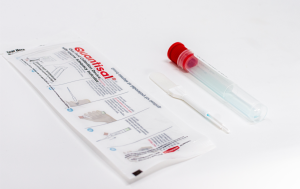
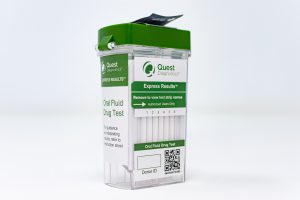
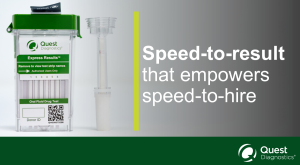
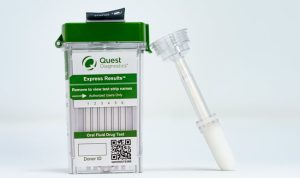




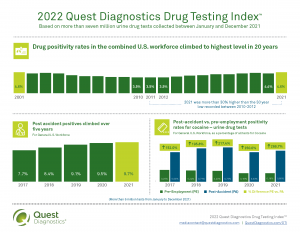










Amid the reality of persistent drug use, Quest Diagnostics Employer Solutions offers data-driven insight and industry experience to help you make the best decisions about building and managing your workforce in order to comply with applicable state and federal requirements.
In the same way that no 2 companies are alike, no 2 state drug testing laws are identical. Each state has its own unique legal requirements, which can include regulations and statutes that on the surface do not appear to be related to drug testing.
Regardless of your industry (transportation, construction, manufacturing, professional, scientific and technical, etc), understanding the intricacies of the diverse makeup of state laws can make the difference between being compliant and being exposed to increased legal liability. There are 5 things every employer should know about state drug testing laws.
How do federal drug testing regulations interact with state laws?
If a state drug testing law directly contradicts a federal regulation, such as the drug and alcohol testing regulations of the US Department of Transportation (DOT), the federal regulations will prevail. It is important to understand that this general rule only applies to employers who are covered by a federal mandate to drug test; it does not apply to the testing of non-covered employees and applicants. For instance, some DOT-covered employers choose to also drug test their non-DOT workers. The non-DOT portion of a company’s program is governed by state laws.
There are certain elements of a comprehensive drug testing program that are not covered by federal regulations. For example, the DOT regulations do not mandate that an employee who fails a drug test be terminated, but state law may impose conditions on taking such action in the event of a first-time positive result. Employers should take the time to know the state laws that apply to them even when complying with a federally mandated drug testing regulation.
For employers with operations in multiple states, which state law applies?
The simple answer is, “all of them.” Some employers make the mistake of assuming that the law of the state where they are headquartered is the only one that applies when developing a drug testing policy. For multi-state employers it is necessary to comply with all applicable state laws.
Generally, a well-written, researched drug testing policy can cover much of the legal requirements for each applicable state law. But addendums to the base policy are often needed when certain state law requirements differ from the basic tenants of a company’s policy.
What is the difference between a voluntary and a mandatory drug testing law?
A number of states have programs that offer special incentives to encourage employers to conduct drug testing. If an employer chooses to participate in such a program, their company must comply with the drug testing requirements of that voluntary program.
For example, Florida offers a 5% discount on workers’ compensation premiums to employers who drug test in accordance with voluntary regulations provided by the state. Outside of that voluntary program employers are free to conduct drug testing as desired, within reason and in compliance with any other applicable state laws.
On the other hand, many states have mandatory drug testing laws that apply to any employer with operations in that state. For instance, if you are an employer in Iowa and you wish to conduct drug testing, you must comply with the state’s existing mandatory drug testing law. It’s also worth noting there are typically no incentives offered in exchange for compliance with mandatory laws.
What is an industry-specific law?
Several states have mandatory laws that apply to specific industries. Illinois, for example, has a mandatory law for companies with public works contracts with the state; it only applies to public works contractors. West Virginia has a mandatory law that applies to certain types of companies in the mining industry.
Additionally, some states have mandatory laws for certain government agencies, police and fire departments, childcare facilities, nursing homes, etc.
Industry-specific laws can be complex as they tend to require drug testing to be conducted under specific circumstances such as following an accident, when reasonable suspicion of drug use exists, or sometimes on a random basis. It is also not uncommon for such laws to defer to other laws and regulations regarding drug testing procedures.
Many laws must be considered, and a variety of workplace implications. Partnering with an experienced company is more important than ever. Quest Diagnostics Employer Solutions provides comprehensive drug testing for businesses that can’t afford to compromise.
What other types of laws affect workplace drug testing laws?
Currently, the most noteworthy non-drug testing state laws that can affect a company’s program are medical and recreational marijuana laws. In some cases, these laws place conditions on employers when acting upon the result of a positive test result for marijuana. In Nevada, for example, employers cannot refuse to hire an applicant who tests positive solely based on the positive marijuana test. In New York, employers are prohibited from testing for cannabis under most circumstances. Additionally, employers may not discriminate against lawful users of marijuana in certain states.
Other state laws that can have a direct impact on drug testing are workers’ and unemployment compensation regulations. In many states, workers’ compensation regulations allow employers to move to deny benefits if the individual was impaired or under the influence of drugs or alcohol at the time of an accident, and a positive drug test result can be used to make that argument. These regulations often include specific requirements for how a test is conducted, including which drugs to include in a test panel.
Finally, most states have prominent or precedent-setting case law that either clarifies a drug testing statute or further defines what employers can and cannot do. In California, for example, case law governs workplace drug testing in the absence of a dedicated law.
Partnering with a compliant laboratory should not be a compromise
While Quest Diagnostics does not provide legal advice relative to state drug testing law, we ensure that our testing processes comply with the stringent requirements of being a laboratory certified by the Substance Abuse and Mental Health Services Administration (SAMHSA).
We recommend that employers research all applicable laws and consult with state law experts to help them better understand how to ensure compliance. In particular, look for state law requirements regarding when to test (pre-employment, post-accident, reasonable suspicion, random, etc), how to test (using a certified laboratory vs rapid-result devices; urine, oral fluid, or hair), and how to collect specimens.
Quest Diagnostics Employer Solutions works as a consultative partner for accurate, accessible drug testing solutions across a full range of testing requirements. We bring real-world expertise, unmatched science, and stringent processes to deliver programs that optimize your candidate experience, help you keep pace with today’s speed of hiring, and reduce workplace risk.
To learn more about starting a drug testing program, visit our website or contact us online.
Learn more about drug testing, visit our website or contact us online.